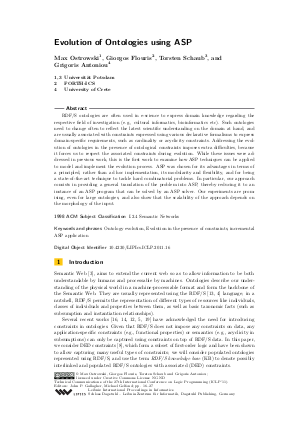Evolution of Ontologies using ASP
Authors Max Ostrowski, Giorgos Flouris, Torsten Schaub, Grigoris Antoniou
-
Part of:
Volume:
Technical Communications of the 27th International Conference on Logic Programming (ICLP'11) (ICLP 2011)
Part of: Series: Leibniz International Proceedings in Informatics (LIPIcs)
Part of: Conference: International Conference on Logic Programming (ICLP) - License:
 Creative Commons Attribution-NonCommercial-NoDerivs 3.0 Unported license
Creative Commons Attribution-NonCommercial-NoDerivs 3.0 Unported license
- Publication Date: 2011-06-27
File

PDF
LIPIcs.ICLP.2011.16.pdf
- Filesize: 490 kB
- 12 pages
Document Identifiers
Subject Classification
Keywords
- Ontology evolution
- Evolution in the presence of constraints
- incremental ASP application
Metrics
- Access Statistics
-
Total Accesses (updated on a weekly basis)
0Document
0Metadata
Abstract
RDF/S ontologies are often used in e-science to express domain knowledge regarding the respective field of investigation (e.g., cultural informatics, bioinformatics etc). Such ontologies need to change often to reflect the latest scientific understanding on the domain at hand, and are usually associated with constraints expressed using various declarative formalisms to express domain-specific requirements, such as cardinality or acyclicity constraints. Addressing the evolution of ontologies in the presence of ontological constraints imposes extra difficulties, because it forces us to respect the associated constraints during evolution. While these issues were addressed in previous work, this is the first work to examine how ASP techniques can be applied to model and implement the evolution process. ASP was chosen for its advantages in terms of a principled, rather than ad hoc implementation, its modularity and flexibility, and for being a state-of-the-art technique to tackle hard combinatorial problems. In particular, our approach consists in providing a general translation of the problem into ASP, thereby reducing it to an instance of an ASP program that can be solved by an ASP solver. Our experiments are promising, even for large ontologies, and also show that the scalability of the approach depends on the morphology of the input.
Cite As Get BibTex
Max Ostrowski, Giorgos Flouris, Torsten Schaub, and Grigoris Antoniou. Evolution of Ontologies using ASP. In Technical Communications of the 27th International Conference on Logic Programming (ICLP'11). Leibniz International Proceedings in Informatics (LIPIcs), Volume 11, pp. 16-27, Schloss Dagstuhl – Leibniz-Zentrum für Informatik (2011)
https://doi.org/10.4230/LIPIcs.ICLP.2011.16
BibTex
@InProceedings{ostrowski_et_al:LIPIcs.ICLP.2011.16,
author = {Ostrowski, Max and Flouris, Giorgos and Schaub, Torsten and Antoniou, Grigoris},
title = {{Evolution of Ontologies using ASP}},
booktitle = {Technical Communications of the 27th International Conference on Logic Programming (ICLP'11)},
pages = {16--27},
series = {Leibniz International Proceedings in Informatics (LIPIcs)},
ISBN = {978-3-939897-31-6},
ISSN = {1868-8969},
year = {2011},
volume = {11},
editor = {Gallagher, John P. and Gelfond, Michael},
publisher = {Schloss Dagstuhl -- Leibniz-Zentrum f{\"u}r Informatik},
address = {Dagstuhl, Germany},
URL = {https://drops.dagstuhl.de/entities/document/10.4230/LIPIcs.ICLP.2011.16},
URN = {urn:nbn:de:0030-drops-31747},
doi = {10.4230/LIPIcs.ICLP.2011.16},
annote = {Keywords: Ontology evolution, Evolution in the presence of constraints, incremental ASP application}
}
